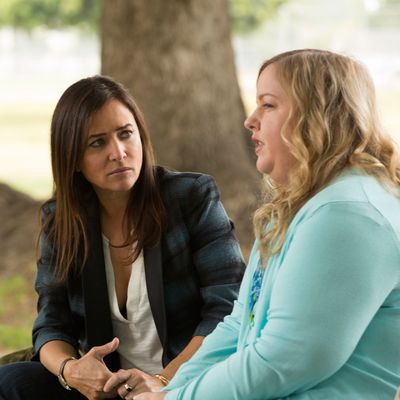
Two years ago, actress Sarah Baker appeared in a much-discussed episode of Louie as a character who aggressively forced Louis C.K. to acknowledge his prejudice against fat women.
On this week’s Better Things, an episode co-written by C.K., Baker appears again as a completely different character, one who aggressively forces Sam (Pamela Adlon) to reconsider her attitudes toward Mormons and toward judging other parents in general.
“One would think that you went in with all kinds of preconceived notions about what a Mormon is and that you held onto them no matter what you saw,” Baker’s Trinity, as in the Holy, says after Sam brings her three daughters to a Sunday service.
Sam: “Oh my God, Trinity, I don’t have anything against … I mean, besides the fact that Mormons hate gays and black people.”
Trinity: “That’s ignorant and cheap.”
Sam: “Those are my two middle names.”
This conversation eventually turns into a back and forth about how the two women judge each other more generally, especially in their roles as mothers. And that’s what “Duke’s Chorus” is really about: the way that people often look down their noses at each other and how that impulse is born out of a fear they’re not doing parenthood — or for that matter, adulthood — the right way.
It’s also about realizing that no parent, not the Bible thumpers, the alleged heathens, or anyone in between, is ever what he or she seems on the surface. Ned, the father who tries to arrange a playdate between Duke and his daughter Nelly, is apparently just trying to put some moves on Sam, something that everyone can see except her. Meanwhile, Trinity — who’s supposedly a woman of faith and decency — can’t even summon the consideration to give Sam a heads-up when she needs her to pick up her daughter (Mormon Morgan!) from choir practice. Oh, and Trinity and her husband are also cheating on each other. I’m not an expert on the Mormon faith, but I am pretty sure that’s frowned upon.
This episode doesn’t have the same emotional heft and natural vibe that characterized last week’s exchanges between Sam and Rich or Sam and her mom. Compared to other episodes of Better Things, the seams in this one show a bit more. When Sam and Trinity tear into each other in that previously noted conversation, for example, it’s a very good scene. But it also comes across a tiny bit more like a scripted exchange rather than a real-life moment that we just happen to observe, which is what Better Things feels like at its best.
That said, a lot of the details in “Duke’s Chorus” ring loud and true, like Max telling Sam she hates her for cutting off access to the Lyft account, the ensuing argument in which Sam almost starts crying and Max impudently tells her that her tears are getting old, and the constant contradictions that creep into various parenting decisions. The best example of those contradictions: Trinity’s explanation of family night, a weekly event where she, her husband, and her kids stay home, cook dinner together and … watch CSI. “You let Madison watch CSI?” Sam asks incredulously, clearly trying to reconcile this with the fact that, mere seconds ago, Trinity said she couldn’t attend an event because she doesn’t drink alcohol, caffeine, or hot beverages.
“It’s based on real-life stories,” Trinity says matter-of-factly, as if that justifies exposing an elementary schooler to graphic autopsies as part of a family bonding experience. That moment captures one of the more fascinating (and judgy) aspects of parenting: learning about the surprising things other moms and dads let their kids do. We all like to think we’re raising our children right, but secretly (or not so secretly) we fear we’re actually doing it dead wrong. So when we find out that other parents permit their kids to engage in six straight hours of screen time, eat dessert for dinner, allow their daughters to come to church in revealing crop tops (something Trinity’s husband makes a point of noticing in regard to Max), or watch wildly inappropriate television shows, it makes us feel superior. It also makes us feel little less guilty about the things we permit in our own homes that other parents might consider shameful. And sometimes, it also makes us feel confused. Sam seems less smug about the CSI thing and more just … baffled.
While I’m not sure that the portrait of Trinity and her family is entirely free of stereotypes — the idea that Madison spits every time Duke says, “Oh my God” is funny, but a little much — I do appreciate that Adlon and C.K. commit to hammering Sam for jumping to such quick conclusions. When Sam realizes that Trinity has a little bit of “nasty woman” coursing through her veins — meaning she curses, commits adultery, and speaks semi-crudely about her sexuality — she’s immediately more comfortable with her. It’s completely hypocritical for Trinity to act like a pure, devout Mormon and engage in this kind of behavior. But Sam’s a hypocrite, too, for accusing Trinity of being judgmental when she can be just as critical of others. To varying degrees, we’re all hypocrites and screwups and it feels good to just admit it.
“I’m failing completely and I don’t need God or Jesus or you to tell me that,” Sam tells Trinity during their big church-courtyard confrontation.
During that same conversation, as Trinity confesses to her own personal problems, she admits that she also “can’t do it” — meaning she can’t be the perfect wife and mother she’s expected to be. “I can’t do it either,” Sam tells her. “You don’t have to do it. You don’t have to. You get up and you do your best.”
Really, that’s all anyone is trying to do. It’s amazing how often we all forget that.


